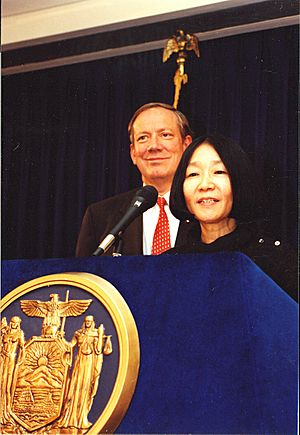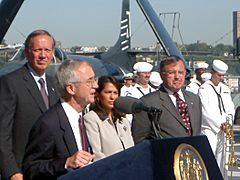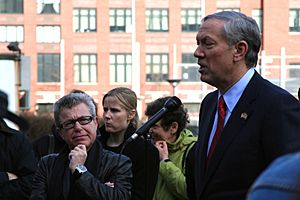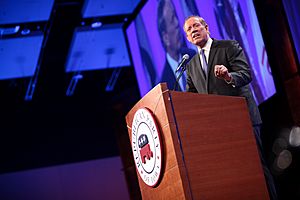George Pataki facts for kids
Quick facts for kids
George Pataki
|
|
|---|---|
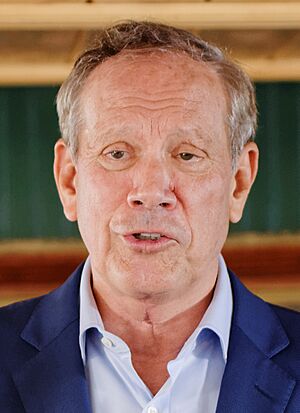
Pataki in 2016
|
|
| 53rd Governor of New York | |
| In office January 1, 1995 – December 31, 2006 |
|
| Lieutenant | Betsy McCaughey Mary Donohue |
| Preceded by | Mario Cuomo |
| Succeeded by | Eliot Spitzer |
| Member of the New York State Senate from the 37th district |
|
| In office January 1, 1993 – December 31, 1994 |
|
| Preceded by | Mary B. Goodhue |
| Succeeded by | Vincent Leibell |
| Member of the New York State Assembly from the 91st district |
|
| In office January 1, 1985 – December 31, 1992 |
|
| Preceded by | William Ryan |
| Succeeded by | Vincent Leibell |
| Mayor of Peekskill | |
| In office January 1, 1981 – December 31, 1984 |
|
| Preceded by | Fred Bianco |
| Succeeded by | Richard E. Jackson |
| Personal details | |
| Born |
George Elmer Pataki
June 24, 1945 Peekskill, New York, U.S. |
| Political party | Republican |
| Spouse |
Libby Rowland
(m. 1973) |
| Children | 4, including Allison |
| Education | Yale University (BA) Columbia University (JD) |
| Signature | |
George Elmer Pataki (born June 24, 1945) is an American politician who was the 53rd governor of New York from 1995 to 2006. A member of the Republican Party, he started his political career as the mayor of Peekskill and later served in the state government.
As governor, Pataki was known for creating new health care programs and for leading the state's recovery after the September 11 attacks. He also helped improve New York's credit rating, which is a measure of how financially healthy the state is.
Pataki decided not to run for a fourth term in 2006. In 2015, he announced he would run for the Republican nomination for president but ended his campaign before the voting began.
Contents
Early Life and Education
George Pataki was born in Peekskill, New York, on June 24, 1945. His family has roots in Hungary, Italy, and Ireland. His father, Louis, was a mailman and volunteer fire chief who ran the family farm. Pataki grew up with an older brother, Louis. He can speak some Hungarian, Spanish, French, and German.
After graduating from Peekskill High School, Pataki went to Yale University on a scholarship and graduated in 1967. He was active in the Yale Political Union, where he enjoyed debating. He then earned a law degree from Columbia Law School in 1970.
Beginning a Career in Politics
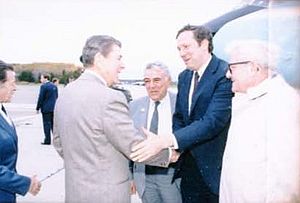
While working as a lawyer, Pataki became friends with Michael C. Finnegan, who helped him plan his political career. Finnegan managed Pataki's campaigns for mayor, state assembly, state senate, and governor.
Mayor of Peekskill
Pataki's first elected position was mayor of his hometown, Peekskill. He won his first election in 1981 and was re-elected in 1983 with strong support from voters.
New York State Assembly
In 1984, Pataki was elected to the New York State Assembly, which is part of the state's law-making body. He represented the 91st district and was re-elected three times, serving until 1992.
New York State Senate
In 1992, instead of running for the Assembly again, Pataki decided to run for the New York State Senate. He won the election and served one term before running for governor.
Campaigns for Governor
1994 Election
When Pataki decided to run for governor in 1994, he was not well-known across the state. He was running against Mario Cuomo, who had already served three terms as governor. Many people thought Pataki would lose.
However, with support from U.S. Senator Al D'Amato, Pataki's campaign gained strength. He promised to serve only two terms if elected. In a close race, Pataki won, becoming the first Republican governor of New York since Nelson Rockefeller.
1998 Election
By 1998, Pataki was a popular governor. He ran for a second term and won easily. He received over 54% of the vote, defeating his Democratic opponent, Peter Vallone.
2002 Election
Pataki decided to run for a third term in 2002, even though he had promised to serve only two. His leadership after the September 11 attacks was a major part of his campaign.
He defeated his opponents, Carl McCall and Tom Golisano, to win his third and final term as governor. This was the last time a Republican was elected governor of New York.
On July 27, 2005, Pataki announced he would not run for a fourth term. He said he wanted to "follow a new path, find new challenges." He was succeeded by Democrat Eliot Spitzer.
Work as Governor
| The Pataki Executive Chamber | ||
|---|---|---|
| Office | Name | Term |
| Governor | George Pataki | 1995–2007 |
| Lieutenant Governor | Betsy McCaughey | 1995–1999 |
| Mary Donohue | 1999–2007 | |
| Secretary to the Governor | Bradford J. Race Jr. | 1995–2002 |
| John P. Cahill | 2002–2007 | |
| General Counsel | Michael C. Finnegan | 1995–1997 |
| James McGuire | 1997–2003 | |
| Richard Platkin | 2003–2007 | |
| Communications Director | Zenia Mucha | 1995–2000 |
| Michael McKeon | 2000–2002 | |
| Lisa Dewald Stoll | 2003–2005 | |
| David Catalfamo | 2005–2007 | |
| Office of the Attorney General | Dennis Vacco | 1995–1999 |
| Eliot Spitzer | 1999–2007 | |
| Office of the Inspector General | Roslynn R. Mauskopf | 1995–2002 |
| Jill Konviser-Levine | 2002–2005 | |
| Dineen Riviezzo | 2005–2007 | |
| Office of the Comptroller | H. Carl McCall | 1995–2003 |
| Alan Hevesi | 2003–2007 | |
| Department of Agriculture and Markets | Donald R. Davidsen | 1995–1999 |
| Nathan L. Rudgers | 1995–2005 | |
| Patrick Brennan | 2005–2007 | |
| Department of Banking | Neil Levin | 1995–1997 |
| Elizabeth McCaul | 1997–2003 | |
| Diana Taylor | 2003–2007 | |
| Department of Civil Service | George C. Sinnott | 1995–2004 |
| Daniel E. Wall | 2004–2007 | |
| Department of Corrections and Community Supervision | Glenn S. Goord | 1995–2007 |
| Department of Environmental Conservation | Michael D. Zagata | 1995–1997 |
| John P. Cahill | 1997–2001 | |
| Erin Crotty | 2001–2005 | |
| Denise Sheehan | 2005–2007 | |
| Education Department | Richard P. Mills | 1995–2007 |
| Department of Health | Barbara DeBuono | 1995–1998 |
| Antonia Novello | 1998–2007 | |
| Insurance Department | Edward Muhl | 1995–1997 |
| Neil Levin | 1997–2001 | |
| Gregory V. Serio | 2001–2005 | |
| Howard Mills III | 2005–2007 | |
| Department of Labor | John E. Sweeney | 1995–1997 |
| James J. McGowan | 1997–2000 | |
| Linda Angello | 2001–2007 | |
| Department of Motor Vehicles | Richard E. Jackson | 1995–2000 |
| Raymond P. Martinez | 2000–2006 | |
| Nancy Naples | 2006–2007 | |
| Department of Military & Naval Affairs | Michael Hall | 1995–1997 |
| John H. Fenimore V | 1997–2001 | |
| Thomas P. Maguire | 2001–2006 | |
| Joseph J. Taluto | 2006–2007 | |
| Department of Public Service | John F. O'Mara | 1995–1998 |
| Maureen Helmer | 1998–2002 | |
| William Flynn | 2002–2006 | |
| Patricia Acompora | 2006–2008 | |
| Secretary of State | Alexander Treadwell | 1995–2001 |
| Randy Daniels | 2001–2006 | |
| Christopher Jacobs | 2006–2007 | |
| Department of Taxation and Finance | Michael H. Urbach | 1995–1999 |
| Arthur J. Roth | 1999–2003 | |
| Andrew Eristoff | 2003–2006 | |
| Department of Transportation | John B. Daly | 1995–1997 |
| Joseph H. Boardman | 1997–2005 | |
| Thomas J. Madison Jr. | 2005–2007 | |
As governor, Pataki was seen as a moderate Republican. He cut taxes and was tough on crime, but he also supported environmental protection and gay rights.
Money and the Economy
Pataki cut taxes for both individuals and businesses. He also created the STAR program, which lowered school property taxes for homeowners. During his time as governor, New York's credit rating went up three times, showing that the state's finances were getting stronger. He also supported building Native American casinos in upstate New York to help local economies.
Laws and Social Issues
- Crime: Pataki made fighting crime a major goal. In 1995, he signed a law that brought back the death penalty in New York, although a court later found the law unconstitutional. During his 12 years as governor, crime rates in New York went down significantly.
- Gay Rights: Pataki supported the Sexual Orientation Non-Discrimination Act, a law to protect gay people from unfair treatment. The law passed in 2002.
- Gun Control: In 2000, Pataki helped pass some of the toughest gun control laws in the nation.
Health and Environment
Pataki's government started several new health care programs. Child Health Plus helped get health insurance for children in poorer families. Family Health Plus did the same for adults. He also signed a law in 2003 that banned smoking in public places.
Pataki was also active in protecting the environment. He created the Clean Water/Clean Air Environmental Bond Act, which provided $1.75 billion for environmental projects. He also protected over a million acres of open space in New York.
Education
Pataki supported the creation of charter schools, which are public schools that are run independently. He also worked to improve the quality of education at the City University of New York (CUNY) colleges.
September 11 Attacks
After the terrorist attacks on September 11, 2001, Governor Pataki worked closely with New York City Mayor Rudy Giuliani. They led the city's and state's response to the tragedy.
Pataki helped create the Lower Manhattan Development Corporation to manage the rebuilding of the World Trade Center site. This included overseeing the construction of the National September 11 Memorial & Museum and the new skyscraper, One World Trade Center (also known as the Freedom Tower).
Life After Being Governor
After leaving office in 2007, Pataki joined a law firm. He also started his own consulting company that focuses on environmental issues.
He has remained involved in politics. He considered running for president in 2008 and 2012 but decided against it.
2016 Presidential Campaign
On May 28, 2015, Pataki announced he was running for the Republican nomination for president. His campaign was considered a long shot because he was seen as more liberal than many other Republican candidates.
His campaign did not attract much support, and he struggled in the polls. On December 29, 2015, he officially ended his campaign. He later endorsed Marco Rubio and then John Kasich for president.
Personal Life
Pataki married his wife, Libby, in 1973. They have four children, including the author Allison Pataki.
In 2006, while he was still governor, Pataki had an emergency operation to remove his appendix. He had a second surgery a few days later but made a full recovery.
Images for kids
-
Pataki with President George W. Bush and Lloyd Stamy.
See also
 In Spanish: George Pataki para niños
In Spanish: George Pataki para niños


